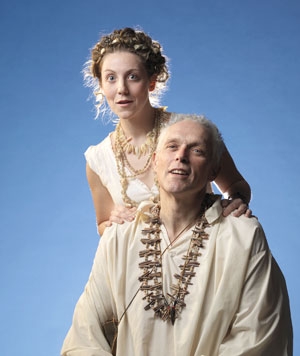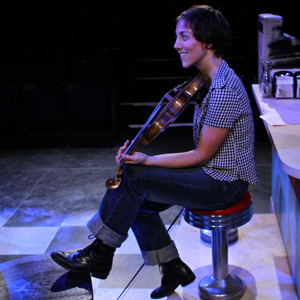Blog
Interview with Julie McIsaac
With a career spanning nearly twenty professional productions, the actor, director and playwright Julie McIsaac has a CV that would make many other artists envious. Having already tread the boards for Bard on the Beach, Arts Club and the Pacific Theatre (to name only a few), this actress will be making her first appearance for Théâtre la Seizième this month. She is playing the sparkling Léa in Des fraises en janvier, her first professional role in French.
|
|
What brought you to pursue a career in theatre?It is actually music that brought me to theatre. My mother insisted that my brothers and I learn to play at least one instrument. It was non-negotiable! Very young, I learned to play the piano, the violin, the oboe and also to sing. When I was twelve years old, the choir at my school was chosen to participate in the musical Joseph and the Amazing Technicolor Dreamcoat, a professional production by an important theatre company in Toronto. It was an amazing experience that opened my eyes to the possibility of having a professional artistic career. Then there was Shakespeare. I studied two of his plays in high school and that was a real revelation for me. While I was completing my degree in music, I was part of the Sock ‘n’ Buskin theatre company at Carleton University. Then I finally took the plunge. I crossed the country to study theatre at the Canadian College of Performing Arts, in Victoria.Among the twenty or so roles you have played up to now, which have had the most impact on you?
It’s difficult to pick just one! My experience with Bard on the Beach was certainly very special. I had the opportunity to play “Miranda” in the Tempest in 2008. It was a magnificent production directed by Meg Roe. The ambiance was poetic, magical, and there was a very special energy in the theatre. The role of “Jane” in Mother Teresa is Dead at the Pacific Theatre also has a special place in my heart. When I read the play for the first time, I thought to myself that I absolutely had to play this role! The arc of the character, her challenges and her history spoke to me enormously. When a play inspires you artistically, and on top of that, on a personal level, those ingredients come together to create a very unique experience. If you had the opportunity to play any role in the dramatic canon, which would you choose? As a fan of Shakespeare, I would love to play “Lady MacBeth”. But not right away… in ten years! She is so intense! I also have a weakness for the musical Jane Eyre, inspired by the book by the British author Charlotte Brontë. The music is magnificent. Of course I would love to play “Jane”, or direct the production. I am always impressed to read a work that was written tens or even hundreds of years ago, and realize that it still resonates today. I find that inspiring, the power of dramatic writing that captures a timeless aspect of human life. |
What influenced you to accept Théâtre la Seizième’s invitation to perform in Des fraises en janvier?
I grew up in a bilingual setting. My mother is Francophone and my father is Anglophone. In my home town, half the names in the phone book were Francophone! Because I studied in English, I found myself drifting away from bilingualism as I grew up. And I miss it a lot. Travelling through Europe, I realized that over there, practically everyone speaks more than one language. It’s normal there to immerse yourself in more than one culture. It is a richness that I want to conserve in my life.
Thanks to a professor in Victoria, I had the chance to work on a monologue by Michel Tremblay in both languages. I immediately discovered that I felt things differently, physically and emotionally, when I acted in French. I was curious about exploring those feelings more. So Théâtre la Seizième’s offer came at the perfect time! It allows me to reconnect with my roots and to explore another facet of the craft of acting.
We’ve often seen you in Vancouver in English productions, but Léa in Des fraises en janvier is your first role in French. How has the experience been so far?
It’s going very well! I’m having a lot of fun, even though of course, it is a challenge. I have to work on my accent and the script in different ways than when I work in English. Let’s say there have been some steps added to my usual process. This is a very positive environment for me to live this experience. Everyone is very encouraging and supportive. There are times when I become conscious of the extra effort required to perform in French, but there are other times when I’m simply in the moment, acting. We’ve begun our last week of rehearsals, and I’m more and more in that second state. That’s positive!
Tell us about your character. Who is Léa?
I really like Léa. She is a young woman who imagined her life would go a certain way, and then suddenly finds out that her reality is quite a bit different. She is at a point in her life where she has to learn to live with that reality, and to even make it better than her little girl dreams. She is brave, romantic, and has a very unique personality. She’s the kind of person that’s not afraid to stand-up for herself, or to get involved in a big adventure, even if she is scared. She also has a little philosophical side that I like a lot. At one point in the play, talking about Robert (played by Joey Lespérance), she says: “I find it is a great ambition to want to read and see beautiful things.” I find that very nice. Her story shows me that when the right person comes into your life, all the preconceived notions you have about love, the ideal partner, relationships, disappear, leaving room for something even more perfect.
You have twice been nominated for a Jessie Richardson Award. What do those nominations mean to you?
The first time it was really, really special. It touched me enormously. I felt welcomed by the community and appreciated. It was also incredible because at the beginning of the project, I didn’t feel I could play that role (Ophelia in Hamlet). To go from those doubts to getting a nomination, going through hours of rehearsals and hard work, was fantastic. It was a crowning achievement that marked an important stage in my professional career. My second nomination was for my role in Mother Teresa is dead, which I already talked about. I loved that play and the role, so the fact that it was recognized by the theatre community was a real bonus!
You also direct plays and you recently directed a play for Twenty Somehting Theatre that will be produced in the spring. How did you come to develop these other aspects of your theatre skills?
I developed an interest in writing and directing at the University of Victoria. In my second year, we had the option to do a workshop in a discipline connected to acting. I chose to write a play. I directed it and presented it in front of an audience. I loved the process. The work of an actor is mostly introspective. We’re only responsible for our own performance, whereas the work of a director is to make sure all the elements of the play come together in a harmonious whole, corresponding to a certain vision. It is a very different kind of work, but at the same time, I feel that those experiences are complimentary. Whether I direct a play or perform a role, I always remember what it’s like to be on the other side, and that helps me to communicate better with my production team, or the audience.
Julie will perform the role of Léa in Des fraises en janvier from February 18 to March 1, 2014. To find out more about her numerous future projects, follow our series Le saviez-vous on our blog or in our newsletter.



